Comprehensive Guide to Garden Maintenance in Pinner
Introduction to Garden Maintenance in Pinner
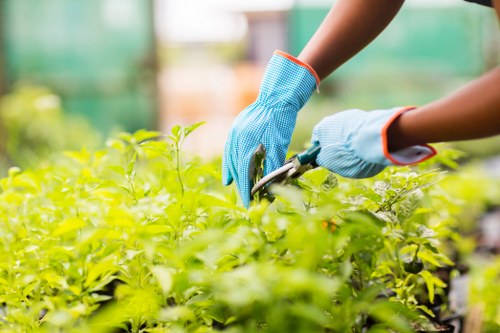
Maintaining a beautiful garden requires dedication, knowledge, and the right tools. In Pinner, where residents take pride in their green spaces, effective garden maintenance is essential for ensuring that gardens remain vibrant and healthy throughout the year.
Understanding the local climate and soil conditions in Pinner is crucial for successful gardening. The area experiences a temperate climate, which influences the types of plants that thrive here. Proper garden maintenance can enhance curb appeal, provide a serene environment, and even increase property values.
Whether you are a seasoned gardener or a novice, this guide will provide you with valuable insights and practical tips to keep your garden in Pinner flourishing.
Seasonal Garden Maintenance Tasks
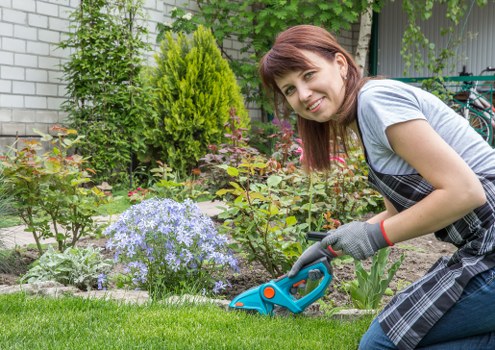
Spring Maintenance
Spring is a critical time for garden maintenance in Pinner. As the weather warms, it's the perfect opportunity to prepare your garden for the growing season.
Key Tasks:
- Pruning dead branches and shaping shrubs.
- Planting new flowers, vegetables, and herbs.
- Applying fertilizers to nourish the soil.
- Cleaning garden beds and removing debris.
By addressing these tasks in spring, you set the foundation for a healthy and productive garden throughout the year.
Summer Garden Care
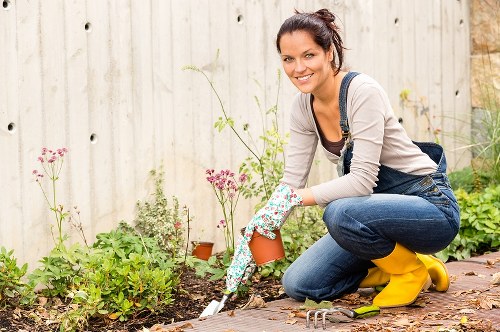
Maintaining Your Garden in the Heat
Summer in Pinner brings longer days and warmer temperatures, which can be both a blessing and a challenge for gardeners.
Important Considerations:
- Regular watering to keep plants hydrated.
- Mulching to retain soil moisture and suppress weeds.
- Monitoring for pests and diseases.
- Pruning to encourage airflow and reduce disease risk.
Implementing these summer maintenance strategies helps ensure that your garden remains lush and vibrant even during the hottest months.
Autumn Garden Preparation
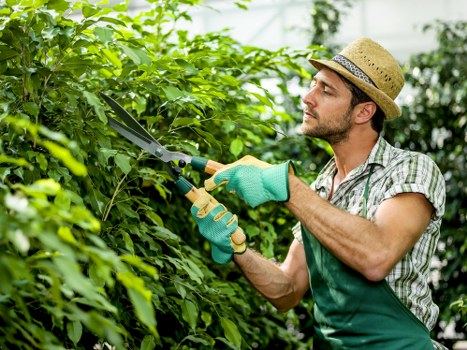
Preparing Your Garden for Winter
As autumn approaches, it's time to prepare your garden for the colder months ahead. Proper preparation can protect your plants and set the stage for a successful spring.
Essential Autumn Tasks:
- Harvesting remaining vegetables and fruits.
- Cutting back perennials and removing spent annuals.
- Composting fallen leaves and garden waste.
- Covering vulnerable plants with protective mulch.
These actions help safeguard your garden from winter's harsh conditions and promote healthy growth when the seasons change.
Winter Garden Maintenance
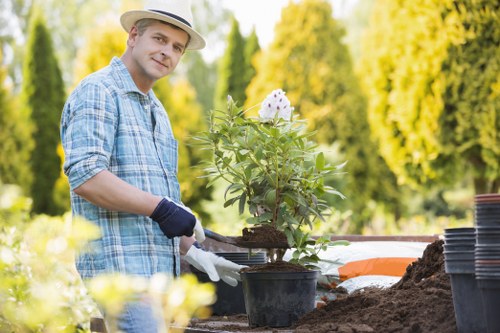
Protecting Your Garden During the Cold Months
Winter may seem like a dormant period for gardens, but there's still important maintenance work to be done in Pinner.
Winter Maintenance Tips:
- Inspecting and repairing garden tools and equipment.
- Planning next year's garden layout and selecting new plants.
- Protecting sensitive plants from frost and snow.
- Maintaining bird feeders and shelters to support local wildlife.
By staying proactive during winter, you ensure that your garden emerges healthy and ready for new growth in the spring.
Essential Tools for Garden Maintenance
Having the right tools is fundamental to effective garden maintenance. In Pinner, where gardens range from small urban plots to spacious suburban landscapes, selecting appropriate tools can make a significant difference.
Must-Have Garden Tools:
- Pruning shears for trimming branches and shaping plants.
- Garden gloves to protect your hands from thorns and dirt.
- Spade and shovel for digging and soil preparation.
- Rakes for clearing leaves and leveling soil.
- Watering cans or hoses with adjustable nozzles for precise watering.
Investing in high-quality tools not only enhances efficiency but also ensures longevity and better results in your garden maintenance endeavors.
Choosing the Right Plants for Pinner Gardens
Selection of plants plays a pivotal role in the success of your garden maintenance efforts. Pinner's climate and soil characteristics influence which plants thrive best.
Best Plants for Pinner:
- Perennials like lavender and hostas provide consistent beauty year after year.
- Annuals such as marigolds and petunias add vibrant seasonal colors.
- Vegetables like tomatoes, lettuce, and carrots are ideal for edible gardens.
- Herbs including rosemary, basil, and mint enhance both culinary and ornamental value.
Choosing native and well-adapted plants reduces maintenance needs and increases the resilience of your garden against pests and diseases.
Soil Health and Fertilization
Healthy soil is the foundation of a thriving garden. Proper soil maintenance and fertilization ensure that plants receive the nutrients they need to grow strong and resilient.
Soil Maintenance Tips:
- Regularly testing soil pH and nutrient levels.
- Adding organic matter like compost to improve soil structure.
- Rotating crops to prevent nutrient depletion and reduce pest buildup.
- Avoiding over-fertilization, which can harm plants and the environment.
Implementing these practices enhances soil fertility and promotes sustainable garden growth.
Watering Strategies for a Healthy Garden
Effective watering is essential for maintaining plant health, especially during the hot summer months in Pinner. Proper irrigation practices conserve water and ensure that plants receive adequate moisture.
Best Watering Practices:
- Watering early in the morning to reduce evaporation.
- Using drip irrigation systems for targeted watering.
- Grouping plants with similar water needs together.
- Checking soil moisture regularly to avoid over or under-watering.
Adopting these strategies helps maintain optimal moisture levels, supporting robust plant growth and minimizing water waste.
Weed Control and Maintenance
Weeds compete with your plants for nutrients, water, and sunlight, making effective weed control a critical aspect of garden maintenance in Pinner.
Effective Weed Management Techniques:
- Regularly removing weeds before they establish deep roots.
- Using mulch to suppress weed growth.
- Employing natural weed killers to minimize chemical use.
- Maintaining healthy plants to outcompete potential weeds.
Consistent weed control not only enhances the appearance of your garden but also promotes the health and vitality of your desired plants.
Pest and Disease Management
Gardens in Pinner are susceptible to various pests and diseases that can hinder plant growth and overall garden health. Implementing proactive management strategies is essential.
Strategies for Managing Pests and Diseases:
- Regularly inspecting plants for signs of infestation or disease.
- Encouraging beneficial insects like ladybugs and bees.
- Using organic pesticides to control pest populations.
- Practicing good garden hygiene by removing diseased plant material.
These measures help maintain a balanced ecosystem in your garden, reducing the impact of harmful pests and diseases.
Lawn Care and Maintenance
A well-maintained lawn enhances the overall appeal of your garden. Proper lawn care in Pinner involves a combination of mowing, watering, and fertilizing.
Lawn Maintenance Tips:
- Mowing your lawn regularly to the appropriate height for your grass type.
- Watering deeply and infrequently to encourage deep root growth.
- Fertilizing in the spring and autumn to provide essential nutrients.
- Aerating the lawn to improve soil structure and reduce compaction.
Consistent lawn maintenance practices result in a lush, green, and resilient turf that serves as the foundation for a beautiful garden.
Garden Design and Layout
Thoughtful garden design and layout contribute significantly to the functionality and aesthetics of your outdoor space in Pinner.
Elements of Effective Garden Design:
- Plant Selection: Choosing plants that complement each other in terms of color, texture, and size.
- Space Utilization: Maximizing the use of available space through strategic planting and arrangement.
- Pathways and Structures: Incorporating elements like paths, benches, and trellises to enhance usability and visual appeal.
- Balance and Harmony: Ensuring that all elements of the garden work together cohesively.
A well-designed garden not only looks inviting but also facilitates easier maintenance and care.
Sustainable Gardening Practices
Embracing sustainable gardening practices in Pinner helps protect the environment and promotes a healthier ecosystem.
Key Sustainable Practices:
- Using native plants that require less water and are more resistant to local pests.
- Implementing rainwater harvesting systems for efficient water use.
- Composting organic waste to enrich the soil naturally.
- Reducing chemical pesticide and fertilizer usage in favor of organic alternatives.
By adopting these practices, you contribute to a sustainable environment while maintaining a beautiful and productive garden.
Professional Garden Maintenance Services in Pinner
While DIY garden maintenance is rewarding, hiring professional garden maintenance services in Pinner can provide expertise and save you time.
Benefits of Professional Services:
- Expert knowledge of local plant species and gardening techniques.
- Access to specialized tools and equipment.
- Customized maintenance plans tailored to your garden's specific needs.
- Consistent and timely upkeep, ensuring your garden remains in pristine condition.
Engaging professionals allows you to enjoy a hassle-free garden, knowing that it is being cared for by experts.
DIY Tips for Effective Garden Maintenance
For those who prefer a hands-on approach, here are some DIY tips to manage your garden maintenance effectively in Pinner.
Top DIY Tips:
- Create a maintenance schedule to stay organized and consistent.
- Use natural fertilizers like compost and manure to nourish plants.
- Implement companion planting to deter pests and promote growth.
- Regularly prune and deadhead flowers to encourage continuous blooming.
These tips help you maintain a healthy and beautiful garden without the need for professional intervention.
Integrating Hardscaping Elements
Hardscaping elements such as patios, pathways, and garden structures enhance the functionality and aesthetics of your garden.
Benefits of Hardscaping:
- Provides structure and organization to your garden layout.
- Creates defined spaces for different garden activities.
- Enhances visual appeal with materials like stone, wood, and metal.
- Increases property value by adding durable and attractive features.
Incorporating hardscaping elements can transform your garden into a versatile and inviting outdoor living space.
Lighting and Garden Ambiance
Proper lighting enhances the beauty of your garden in Pinner, allowing you to enjoy the space even after dark.
Lighting Ideas:
- Install solar-powered lights along pathways for safety and convenience.
- Use string lights to create a cozy and inviting atmosphere.
- Incorporate spotlights to highlight focal points like trees or sculptures.
- Utilize lanterns and fairy lights for subtle and decorative illumination.
Thoughtfully placed lighting can transform your garden, making it a magical retreat during the evening hours.
Garden Irrigation Systems
Efficient irrigation systems are vital for maintaining a healthy garden, especially during dry periods in Pinner.
Types of Irrigation Systems:
- Drip Irrigation: Delivers water directly to the plant roots, minimizing waste.
- Sprinkler Systems: Suitable for larger areas and lawns, providing uniform coverage.
- Rainwater Harvesting: Collects and stores rainwater for later use, promoting sustainability.
- Smart Irrigation: Utilizes sensors and timers to optimize watering schedules.
Choosing the right irrigation system can significantly reduce water consumption and ensure that your garden receives the precise amount of moisture it needs.
Composting and Soil Enrichment
Composting transforms organic waste into nutrient-rich compost, enhancing soil fertility and structure in your Pinner garden.
Composting Tips:
- Collect kitchen scraps, garden waste, and leaves for your compost pile.
- Maintain a balanced mix of green and brown materials to promote decomposition.
- Turn the compost regularly to aerate and speed up the process.
- Use the finished compost to enrich soil, improve drainage, and retain moisture.
Implementing composting practices not only reduces waste but also creates a sustainable source of nutrients for your garden.
Maintaining Garden Structures
Garden structures like trellises, pergolas, and fences add functionality and charm to your garden in Pinner. Proper maintenance ensures their longevity and aesthetic appeal.
Maintenance Tips for Garden Structures:
- Regularly inspect for signs of wear, damage, or rot.
- Apply protective coatings like paint or sealant to prevent weather damage.
- Clean structures periodically to remove dirt, mold, and mildew.
- Secure loose joints and reinforce weak areas to maintain structural integrity.
Well-maintained garden structures enhance the beauty and functionality of your outdoor space, providing support for plants and creating inviting areas for relaxation.
Creating a Wildlife-Friendly Garden
Attracting and supporting wildlife enriches your garden's ecosystem and contributes to environmental sustainability in Pinner.
Tips for a Wildlife-Friendly Garden:
- Plant a variety of native species to provide food and habitat for local wildlife.
- Install birdhouses, bat boxes, and insect hotels to encourage biodiversity.
- Provide water sources like birdbaths and small ponds.
- Avoid using pesticides and chemicals that can harm beneficial insects and animals.
Creating a habitat that supports various forms of wildlife enhances the natural beauty and ecological balance of your garden.
Pruning and Trimming Techniques
Proper pruning and trimming are essential for maintaining plant health, encouraging growth, and enhancing the appearance of your garden in Pinner.
Effective Pruning Practices:
- Use sharp, clean tools to make precise cuts.
- Prune at the right time of year for each plant species.
- Remove dead, diseased, or damaged branches promptly.
- Shape plants to improve air circulation and sunlight penetration.
Consistent pruning and trimming ensure that your plants remain healthy, attractive, and well-maintained.
Mulching for Garden Health
Mulching is a simple yet effective garden maintenance practice that offers numerous benefits for your plants and soil in Pinner.
Benefits of Mulching:
- Retains soil moisture, reducing the need for frequent watering.
- Suppresses weed growth, minimizing maintenance efforts.
- Regulates soil temperature, protecting roots from extreme heat or cold.
- Improves soil structure and adds organic matter as it decomposes.
Applying mulch around your plants creates a healthier growing environment and simplifies garden maintenance tasks.
Maintaining Garden Paths and Walkways
Garden paths and walkways not only provide access to different areas but also add architectural interest to your garden in Pinner.
Path Maintenance Tips:
- Ensure paths are free from debris and obstructions.
- Repair any cracks or uneven surfaces promptly to prevent accidents.
- Incorporate edging materials to keep path boundaries defined.
- Choose durable materials like stone, gravel, or paving for longevity.
Well-maintained paths enhance the functionality and visual appeal of your garden, making it easier to navigate and enjoy.
Greenhouse and Seasonal Structures
Adding a greenhouse or seasonal structures to your garden provides additional growing space and extends the gardening season in Pinner.
Advantages of Greenhouses:
- Protects plants from harsh weather conditions.
- Allows for year-round cultivation of certain plant species.
- Creates a controlled environment for delicate or exotic plants.
- Enhances the overall functionality and aesthetics of your garden.
Incorporating greenhouses or similar structures expands your gardening possibilities and supports the growth of a diverse range of plants.
Garden Safety and Accessibility
Ensuring that your garden is safe and accessible is an important aspect of garden maintenance, particularly for families with children or individuals with mobility challenges in Pinner.
Safety and Accessibility Tips:
- Clearly define walkways to prevent trips and falls.
- Use non-slip materials for paths and steps.
- Ensure adequate lighting for visibility during evening hours.
- Incorporate raised beds or accessible planting areas for easy gardening.
Prioritizing safety and accessibility makes your garden a welcoming and secure space for everyone to enjoy.
Enhancing Garden Aesthetics
Creating visually appealing garden aesthetics involves thoughtful planning and creative design elements tailored to your personal tastes and the natural surroundings in Pinner.
Aesthetic Enhancement Ideas:
- Incorporate color schemes that complement each other and the overall environment.
- Add decorative elements like sculptures, fountains, or garden art.
- Use a variety of plant heights, textures, and shapes for depth and interest.
- Integrate seating areas to create focal points and relaxation spots.
Enhancing your garden's aesthetics not only increases its beauty but also creates a more enjoyable and inviting outdoor space.
Final Thoughts on Garden Maintenance in Pinner
Effective garden maintenance in Pinner requires a combination of knowledge, planning, and consistent effort. By following the guidelines and tips outlined in this guide, you can create and maintain a garden that is not only beautiful but also healthy and sustainable.
Ready to transform your garden?
Contact us today to book your garden maintenance service and take the first step towards a stunning outdoor sanctuary.

